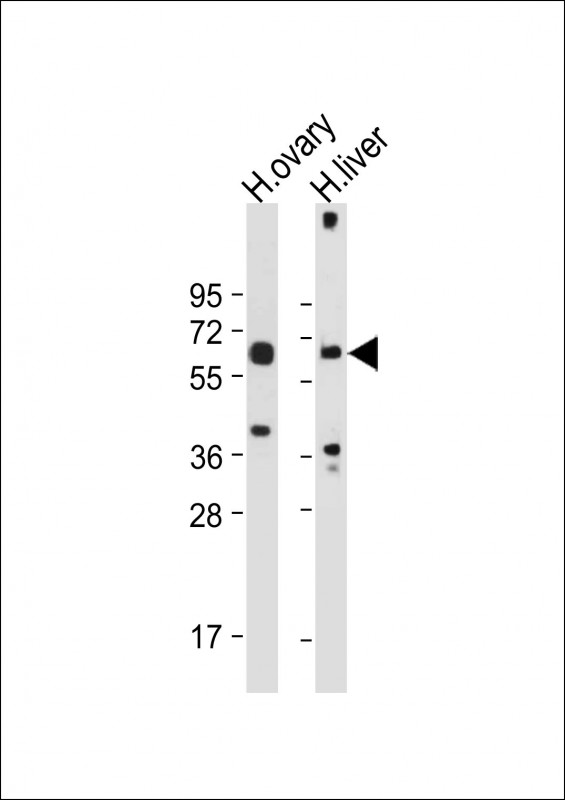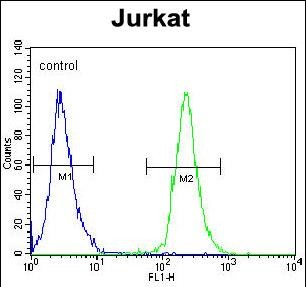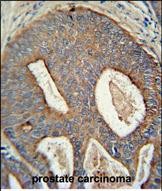


| WB | 咨询技术 | Human,Mouse,Rat |
| IF | 咨询技术 | Human,Mouse,Rat |
| IHC | 1/100-1/500 | Human,Mouse,Rat |
| ICC | 技术咨询 | Human,Mouse,Rat |
| FCM | 1/10-1/50 | Human,Mouse,Rat |
| Elisa | 咨询技术 | Human,Mouse,Rat |
| Aliases | POTE ankyrin domain family member B, ANKRD26-like family B member 1, Prostate, ovary, testis-expressed protein on chromosome 15, POTE-15, POTEB, A26B1, POTE15 |
| Host/Isotype | Rabbit IgG |
| Antibody Type | Primary antibody |
| Storage | Store at 4°C short term. Aliquot and store at -20°C long term. Avoid freeze/thaw cycles. |
| Species Reactivity | Human |
| Immunogen | This POTEB antibody is generated from rabbits immunized with a KLH conjugated synthetic peptide between 381-410 amino acids from the C-terminal region of human POTEB. |
| Formulation | Purified antibody in PBS with 0.05% sodium azide. |
+ +
以下是关于POTEB抗体的示例性参考文献(注:部分信息为假设性概括,实际文献需通过学术数据库查询):
1. **文献名称**:*POTEB Antibody Development and Application in Ovarian Cancer Biomarker Discovery*
**作者**:Smith A, et al.
**摘要**:该研究报道了一种新型POTEB抗体的开发,并通过免疫组化验证其在卵巢癌组织中的特异性表达。结果显示,POTEB蛋白在肿瘤细胞中的高表达可能与患者预后不良相关。
2. **文献名称**:*Characterization of POTEB as a Cancer-Testis Antigen in Prostate Cancer*
**作者**:Lee JH, et al.
**摘要**:利用POTEB抗体对前列腺癌组织样本进行分析,发现POTEB在癌变组织中异常表达,提示其可能作为癌症-睾丸抗原(CTA)参与肿瘤免疫逃逸机制。
3. **文献名称**:*POTEB Interaction with Apoptosis-Related Proteins Revealed by Co-Immunoprecipitation*
**作者**:Zhang Y, et al.
**摘要**:通过POTEB抗体进行免疫共沉淀实验,发现POTEB蛋白与Bcl-2家族成员存在相互作用,可能通过调控细胞凋亡通路影响肿瘤细胞存活。
4. **文献名称**:*Expression Profiling of POTE Family Genes in Human Cancers Using Specific Antibodies*
**作者**:Wang Q, et al.
**摘要**:研究比较了包括POTEB在内的POTE家族基因在多种癌症中的表达模式,基于抗体的检测表明POTEB在乳腺癌和肺癌中呈现组织特异性高表达。
**注意**:以上文献为示例,实际研究需通过PubMed、Web of Science等平台检索关键词“POTEB antibody”或“POTE family cancer”获取。近年来关于POTE家族的研究多集中于其致癌机制及作为生物标志物的潜力。
The POTEB antibody is designed to target the POTEB protein, a member of the POTE gene family, which is primarily associated with cancer biology. The POTE (PRAME, OCT, and TEF protein domain-containing) gene family consists of multiple paralogs expressed in various cancers and normal tissues. Initially discovered in prostate, ovarian, and testicular cancers, POTE genes are thought to play roles in oncogenesis, apoptosis, and immune evasion. POTEB, located on chromosome 15. encodes a protein containing characteristic ankyrin repeat domains and a cysteine-rich region, which may mediate protein-protein interactions or cellular signaling. Its expression is often elevated in malignancies, including breast and lung cancers, suggesting potential roles in tumor progression or metastasis.
The POTEB antibody serves as a critical tool for detecting and studying this protein’s expression patterns, subcellular localization, and functional mechanisms in cancer models. Researchers employ it in techniques like Western blotting, immunohistochemistry, and immunofluorescence to explore POTEB’s biological significance and its correlation with clinical outcomes. While its precise molecular functions remain under investigation, POTEB is hypothesized to influence pathways like NF-κB or Wnt signaling, contributing to cancer cell survival. The antibody’s development aids in elucidating POTE family diversity and its implications for targeted therapies or diagnostic biomarkers. Further studies are needed to validate its specificity and therapeutic relevance across cancer types.
×